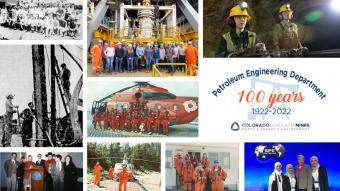
The Petroleum Engineering Department at Colorado School of Mines will mark its 100th Anniversary in 2022 by founding the PE Hall of Fame, which recognizes alumni, faculty and supporters for their contributions to the oil and gas industry and to the department. Each of the 12 inaugural inductees has been recognized as an outstanding industry member through their contributions or leadership.
Mines’ Petroleum Engineering Department is one of the oldest and highest-ranked programs in the United States. Nearly 5,000 students have come from around the world to earn hands-on, interdisciplinary applied science undergraduate and graduate degrees. Mines graduates have led all facets of the oil and gas industry, invented techniques that are now standard and made fundamental research discoveries.
Mines will unveil the Hall of Fame at the PE100 Hall of Fame Gala on Nov. 4, 2022. Join us at this event to recognize the honorees and celebrate the Mines' Petroleum Engineering Department. All proceeds will go to the PE 100 Anniversary Excellence Fund.
2022 Petroleum Engineering Department Hall of Fame Inductees
Dr. Victor C. Alderson, a pioneer educator in the oil and gas industry, founded Mines’ Petroleum Engineering Department in 1921. He served as university president for two terms, 1903 to 1913 and 1917 to 1924. An expert in oil shale, he wrote one of the first textbooks on the topic. He received an honorary doctorate from Mines in 1938 and was recognized for his contributions with the construction of Alderson Hall in 1953. Alderson died in 1948.
Steve Chesebro’ helped found the Natural Gas Council, its Reliability Council and the Gas Industry Standards Board. Chesebro’ is a 1964 Mines graduate with a professional degree in petroleum engineering. He has led an influential industry career, including 32 years with Tenneco culminating as president and CEO of Tenneco Energy, and executive positions at Pennzoil and Harvest Natural Resources. Chesebro’ has served on the Colorado School of Mines Foundation Board of Governors since 2009. He and his wife Dollie created an endowed chair and faculty development fund in the department. He received the Mines Distinguished Achievement Medal in 1991 and an honorary doctorate in 1998.
Dr. DeAnn Craig was the first female president of the Society of Professional Engineers and the American Institute of Mining, Metallurgical, and Petroleum Engineers. She earned five degrees from Mines: two bachelor’s, two master’s and a PhD in petroleum engineering. Craig advanced her career in drilling and production strategy into leadership positions in international oil and gas. She was an adjunct professor in the petroleum engineering department and served on the university’s Board of Trustees and the Colorado School of Mines Foundation’s Board of Governors. Craig died in 2019.
Lawrence “Buck” Curtis is considered the “father” of the Tension Leg Platform, radically changing industry thinking about what is possible in deep water, hostile oilfield developments. Curtis graduated from Mines in 1949 with a professional degree in petroleum engineering. He had a 38-year career with Conoco Inc., and served as president of the American Institute of Mining, Metallurgical and Petroleum Engineers and the Society of Professional Engineers. He was inducted into the National Academy of Engineering and the Offshore Petroleum Engineers Hall of Fame. He received the Mines Distinguished Achievement Medal in 1980 and was a loyal Mines alumni and donor. Curtis died in 2017.
Robert “Chuck” Earlougher, an entrepreneur and engineer, is credited with keeping Long Beach, Calif. from sinking using a water injection system to compensate for oil extraction. He graduated from Mines with a professional degree in petroleum engineering in 1936. He was an expert in using fluid injection for enhanced recovery from hydrocarbon reservoirs and in 1980 received the AIME Anthony F. Lucas Gold Medal to honor his work. Earlougher received a Distinguished Achievement Medal from Mines in 1960 and the Coolbaugh Memorial Award in 1997. He and his wife established a scholarship to support non-resident petroleum engineering students. He died in 2007.
Lincoln F. Elkins was a pioneer in enhanced oil recovery and contributor to the technology of reservoir and production engineering. He graduated from Mines in 1940 with a professional degree in petroleum engineering, after which he enjoyed a 36-year career at Amoco, Conoco and Sohio Petroleum Company (now BP). Elkins received the AIME Anthony F. Lucas Gold Medal in 1992 for his contributions to reservoir and production engineering. He was an active volunteer at Mines, and received a Distinguished Achievement Medal in 1980. Elkins died in 2001.
Lloyd Elkins, Sr., is known as the “father of hydraulic fracturing.” He held 14 patents. A 1934 Mines graduate with a professional degree in petroleum engineering, Elkins worked his way up the ranks of the Pan American Petroleum Corporation from roustabout to production research director over 32 years. He was president of the Society of Petroleum Engineers and the American Institute of Mining, Metallurgy and Petroleum Engineers and received the AIME Anthony F. Lucas Gold Medal in 1966. Elkins was awarded the Mines Distinguished Service Medal in 1961 and the Coolbaugh Memorial Award in 1990. He died in 2004.
Dennis E. Gregg developed an integrated project management protocol that became industry standard. Gregg graduated from Mines in 1950 with a professional degree in petroleum engineering. He spent 43 years with Conoco, where he led Conoco’s multi-billion-dollar integrated deepwater development efforts. Gregg was president of the Society of Professional Engineers and board chairman of the Offshore Technology Conference. He received multiple distinguished awards, including Mines’ Distinguished Achievement Medal in 1994.
Hugh E. Harvey, Jr., is known for applying horizontal drilling techniques to potash extraction. Harvey, who earned a bachelor’s degree in mining in 1974 and a master’s degree in petroleum engineering in 1980, is one of Mines’ most significant contributors. In 2009, the Hugh and Michelle Harvey Family Foundation founded the Harvey Scholars Program, which provides full tuition and fees plus study abroad, making 150 awards through 2022. He is a member of the Mines Foundation Board of Governors and received a Distinguished Achievement Medal from the school in 2011.
Theodore “Ted” W. Nelson was a distinguished leader in the oil and gas industry known for being part of teams that discovered one of the world’s largest gas fields and another that developed the Houdry and TCC catalytic cracking process. He graduated from Mines in 1934 with a professional degree in petroleum engineering, then enjoyed a long career at Mobil Oil Corporation, retiring in 1977. Upon his retirement Mobil named a geophysical ship after him. Nelson received a Mines Medal in 1964 and also served on Mines’ Board of Trustees. He died in 2011.
Ralph J. Schilthuis was a thought leader in applying production research and engineering principles to problems of industrial management. After graduating from Mines in 1930 with a professional degree in petroleum engineering, Schilthuis launched a 34-year career with Humble Oil, interrupted by four years of service at the Office of Petroleum in Washington, D.C. during World War II. He received several awards, including the Society of Professional Engineers John Franklin Carll Award, the Alfred Noble Prize, and the Mines Distinguished Achievement Medal. He was a lifetime university donor. He died in 1964.
Russell H. Volk pioneered petroleum exploration and development in the Denver-Julesburg basin. Volk was considered one of the greatest student-athletes in Mines history, earning 15 varsity letters in football, wrestling, boxing, basketball and baseball. A 1926 graduate as an “engineer of mines,” Volk was an instructor while earning his master’s in mining engineering. After graduation, he and other faculty formed the Plains Exploration Company, and he was president and CEO. Volk was deeply involved at Mines, serving on the boards of the University and Foundation and as president of the Alumni Board. Volk was inducted into Colorado Sports Hall of Fame in 1977 and Mines Athletics Hall of Fame in 1997. In 1974, the campus gymnasium was renamed in his honor. Volk died in 1973.




